




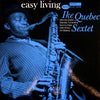
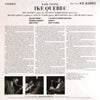
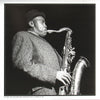
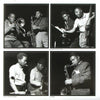
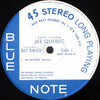
Ike Quebec – Easy Living (2LP, 45RPM)
ORDER LIMITED TO ONE ITEM PER CUSTOMER
Saxophone – Ike Quebec, Stanley Turrentine
Bass – Milt Hinton
Drums – Art Blakey
Piano – Sonny Clark
Trombone – Bennie Green
Written by Ma Rainey (A1), Bennie Green (B1), Stanley Turrentine (B2), George Gershwin, Ira Gershwin (C1), Jack Albertson, Lindy Doherty, James Van Heusen, Judy Lynn, Rose Marie (D1), Ralph Rainger, Leo Robin (D2)
2LPs, gatefold jacket
Limited numbered edition
Original analog Master tape : YES
Heavy Press : 180g
Record color : black
Speed : 45 RPM
Size : 12'’
Stereo
Studio
Record Press : Audiophile pressing
Label : Music Matters Ltd
Original Label : Blue Note
Recorded January 20, 1962 Studio Van Gelder Studio, Englewood Cliffs, NJ
Engineered by Rudy Van Gelder
Original session produced by Alfred Lion
Reissue produced by Michael Cuscuna
Design by Henry Marquez
Photography by Francis Wolff
Liner Notes by Michael Cuscuna
Originally released in 1987
Reissued in 2013
Tracks:
Side A:
1. See See Rider
Side B:
1. Congo Lament
2. Que's Pill
Side C:
1. I've Got A Crush On You
Side D:
1. Nancy
2. Easy Living
Reviews:
"The release history behind Ike Quebec's Easy Living session is pretty convoluted. Eight songs were recorded in all, five of them bluesy sextet jams and three of them ballad standards in Quebec's trademark romantic style. The LP was slated to feature three of the blues tunes and all of the ballads, but remained unissued; in 1981, all five blues were released as Congo Lament, and in 1987, Easy Living was issued on LP in its originally intended, six-song form. Blue Note's CD reissue cuts through all the confusion by gathering all eight songs, grouping the blues cuts together in the first part of the album for continuity's sake. The sextet lineup is absolutely stellar, featuring fellow tenor Stanley Turrentine, trombonist Bennie Green, pianist Sonny Clark, bassist Milt Hinton, and drummer Art Blakey -- all extremely well suited to the blues material that leads off the album. On the standards, Quebec performs with the rhythm section only, and Clark's soft touch takes over the backdrops. His lines on these selections are long and lyrical, full of harmonic details as well as atmosphere. Contrast that with the album's exuberant first half, highlighted by a raucous romp through "See See Rider," where Quebec's wide swing-era vibrato meshes fantastically with Green's down'n'dirty trombone slides. Green's two originals, "Congo Lament" and "B.G.'s Groove Two," are both winning and rhythmically infectious, while Quebec's "I.Q. Shuffle" is the most bop-tinged sextet workout. The mood isn't as unified as some of his carefully calibrated romantic dates, but Easy Living offers the two strongest sides of Quebec's musical personality in one place, encapsulating a great deal of what he did best." AllMusic Review by Steve Huey.
"Ike Quebec is one of those funny figures in Blue Note Records' history. By the late fifties, after he'd been out of recording for a number of years, he was too old to really be at the hard-bop vanguard (he was born in 1918) but not old enough to be a senior statesman like Coleman Hawkins or Duke Ellington. Much of his involvement with the record label in those years was as an A&R man, scouting for new talent for the label's owner Alfred Lion. Considered in the context of musical fashion it might be fair to say that, at the dawn of the 1960s, his own musical style was a little dated, even passé.
But to hell with fashion; Quebec was a terrific musician and wonderful, big blue tenor saxophone (and occasionally piano) player. His chops might have been rooted in the swing of the late 1930s and '40s but, as the saying goes, good taste never goes out of style.
Music Matters has re-mastered Quebec's last outing for Blue Note, Easy Living, on two 45RPM vinyl records. Recorded in 1961 but released posthumously in 1987, the date features classic Rudy Van Gelder recording sound, recaptured from the original master tapes on state of the art equipment. As with all of the Music Matters Blue Note reissues, the goal is to create an all- analog record with the best possible sonics.
The first disk adds Stanley Turrentine on a second tenor, and Bennie Green on trombone. These tracks are tight and well-written, with excellent solos from both Quebec and—with a more 1960s modern playing style—Turrentine. The opening "See See Rider" is a greasy slow chitlin circuit blues that sets the tone for the whole record. It's hard to go wrong with Mr. T on anything, and Sonny Clark's comping and occasional fills are shear perfection.
But the real meat of the album is on the last three tunes. Turrentine and Green bow out, leaving Quebec in the sole spotlight. His tone is warm, smooth and full, and his balladeering is second to none. "Nancy" possesses the kind of playing that never grows old: tender and emotive, but powerful too. It doesn't hurt that the recording captures the saxophone with exceptional realism, even if the overall recording retains that period Blue Note sound. The title track closes the date with more brilliant slow play, with Quebec showing his period roots. It's clear that he came from the school that began with Coleman Hawkins and later begat Lester Young and, especially, Ben Webster. That's a favorable comparison and Quebec plays as well as any of them.
It's sad to note that within a year of recording Easy Living, both Quebec and Clark would be dead (Quebec from lung cancer and Clark from fast living). But the record is testament to the shear quality of their talent. Some recordings are timeless, and this is one of them. Easy Living is a record always worth hearing and appreciating." All About Jazz Review by Greg Simmons
Ratings :
AllMusic : 4.5 / 5 ; Discogs : 4.88 / 5





